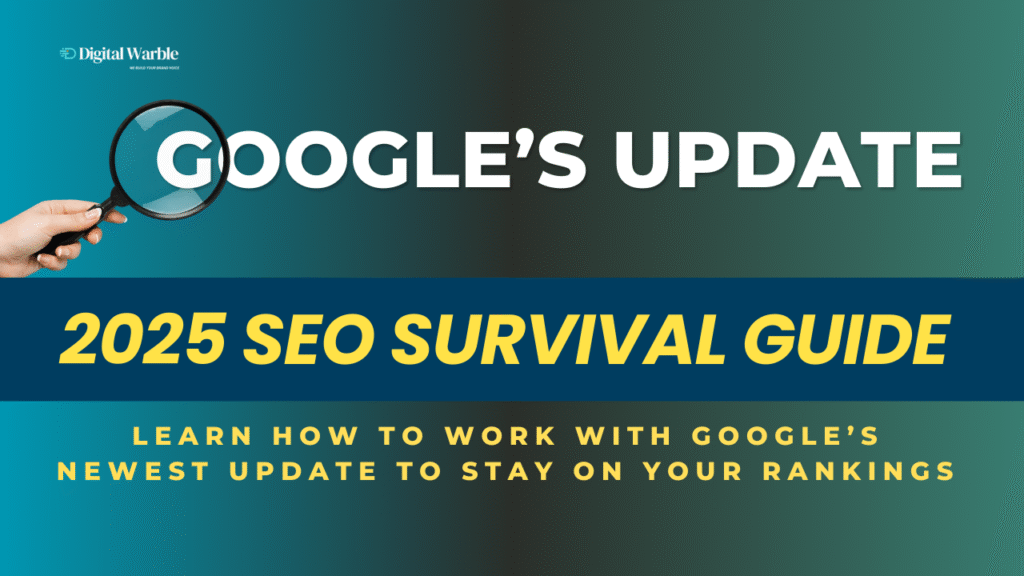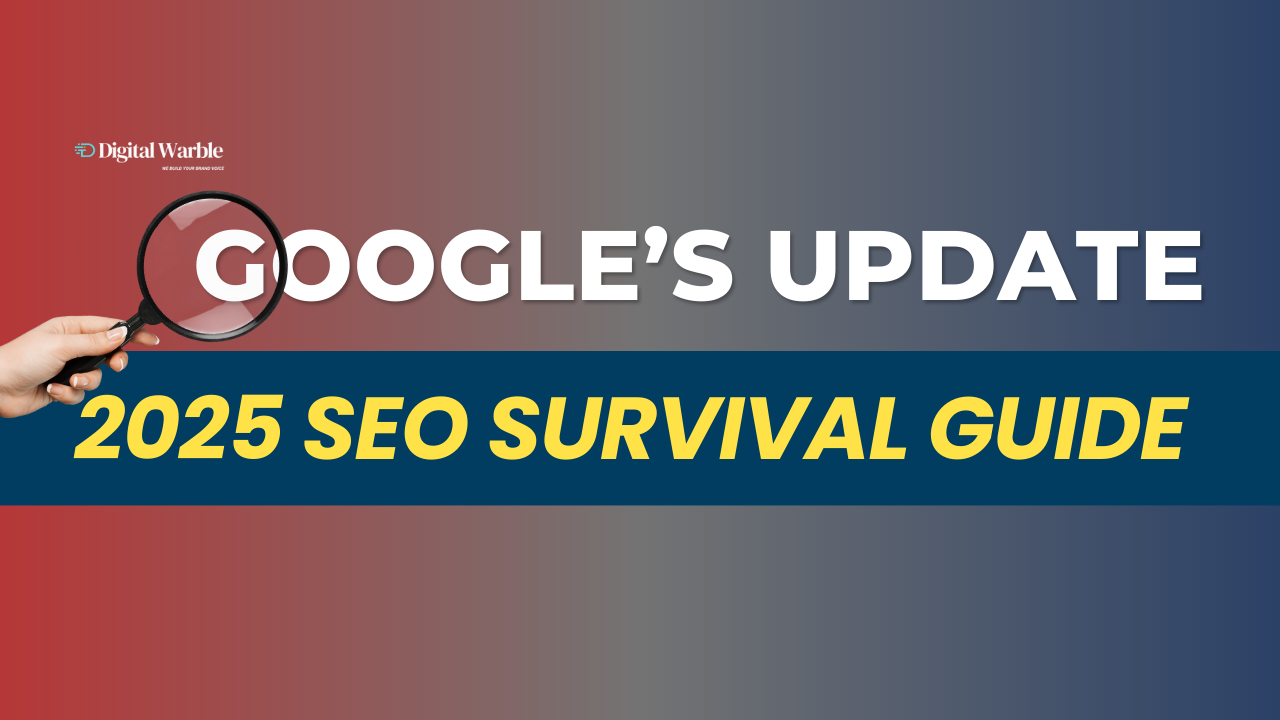Your 2025 SEO Survival Guide: AI Overviews, E-E-A-T, and Decoding the Latest Google Update
A New Update By Google (Likely Mid-to-Late May 2025): An Analysis for SEO Service Providers
While Google doesn’t always pre-announce every update, the SEO landscape in late May 2025 is significantly shaped by the ongoing impact of the March 2025 Core Update and the increasing prominence of AI-powered features in Search Generative Experience (SGE), now often referred to as AI Overviews. Additionally, the May 2025 unconfirmed volatility suggests potential refinements or more minor updates are also in play. For SEO service providers, understanding these shifts is crucial and empowering for maintaining and improving client rankings.

I’ll cover what’s important and any alterations you need to make.
The Primary Themes of Updates and what is most essential for you to:
Emphasis on High-Quality, Helpful, and People-First Content: This, however, stays the same pillar. Google’s algorithms are far more effective in recognizing content authored primarily to exploit searches and content that serves users. The Helpful Content update has now been folded into the core algorithm, reinforcing the value and importance of your work in providing high-quality content that serves users.
Elevate Your Expertise, Authoritativeness, and Trustworthiness (E-E-A-T): This is especially true with unreliable information, particularly on YMYL pages. E-E-A-T is essential now and more than ever.
Focus on User Experience (UX) and Page Experience: User experience optimization includes the core web vitals (most significant contentful paint, first input delay, and cumulative layout shift), which are confirmed ranking factors. Providing an effortless, quick, and stable experience for users on every device is crucial and a testament to your focus and attention to your users’ needs.
AI Overview Integration (SGE): This is a revolutionary feature. Google now features ‘direct answers and summaries’ given by AI at the top of the search results. This can result in zero-click searches, where users do not have to access a site. Understanding and adapting to this new feature is crucial for SEO service providers to maintain and improve client rankings.
Spam and Low-Quality Content Combat: Google continuously works to lessen spam, including AI-driven spam, empty content, and abusive link-building strategies outside genuine value work. For instance, avoiding keyword stuffing, creating thin content, or participating in link schemes are some practices that fall under this category and should be avoided.
Understanding Search Intent: Matching content with other types of search intent (informational, navigational, transactional, or commercial investigation) is crucial for ranking; therefore, understanding search intent is key.
The Importance of Topical Authority: Demonstrating adequate knowledge of a group of related topics enables Google to regard your site as a resource and shows the importance of topical authority. Your site is considered an expert in a specific niche or subject, which can significantly boost your SEO rankings.
What SEO Service Providers Should Do to Rank in Google Now:
Reinforce the strategy for the creation of high-quality original content
- Align with User Needs: Define the target audience and determine their questions, problems, or information gaps. Develop content that comprehensively addresses those gaps.
- Avoid Keyword Stuffing. Keywords need to be added seamlessly within the content. Write naturally without sounding robotic, and aim to provide value to the reader.
- Incorporate Different Types of Content Formats: Add text and images, as well as videos, podcasts, and infographics. The goal is to enhance learning experiences through different forms of media.
- Maintain Updates and Accuracy: Regularly update existing content to ensure it’s accurate, relevant, and reflects the latest information. Add “last updated” dates.
- Aim for Comprehensive Coverage: Explain topics in-depth and go the extra mile when exploring the issue to become the number one go-to expert in that niche.
E-E-A-T Builds Strong And Trusted Signals:
- Manage and Highlight Identified Expertise: Identify your publication’s content creators and editors. Add detailed editor bios linked to their social profiles or other evidence of expertise.
- Establish Authoritativeness: Get backlinks from popular sites relevant to your industry or niche so they can be mentioned as reliable sources.
- Enhance Trustworthiness: Ensure your website is secure (HTTPS), has clear privacy policies and terms of service, and provides accurate contact details. Customer reviews and testimonials can also contribute. Fact-check your content and cite credible sources.
Optimize for Excellent User and Page Experience:
- Focus on Core Web Vitals: Check the page’s loading speed, interactivity, and visual stability. Use tools such as Google PageSpeed Insights or Lighthouse to find and fix any issues.
- Maintain Mobile Usability: Optimizing your website for mobile interfaces is critical to its success because mobile-first indexing prioritizes mobile usability.
- Improve Site Navigation: Users should be able to locate the information they want without being restricted by a confusing site structure, menus, and internal linking.
- Enhance Engagement: Improve retention time on website pages by employing bold images, headings, subheadings, and interactive features dispersed throughout the text.
Adapt to the Era of AI Overviews (SGE):
- Provide Detailed Answers to Pertinent Questions: Ensure that all content responds to a common question related to the target keywords. Use the question format and headings H1-H6.
- Aim for Featured Snippet Status: Content should be presented concisely and understandably so that Google can use it for snippets and quick-reference extracts.
- Build Topical Authority: The more broad the content regarding a specific topic, the more likely it is to be cited as a source in AI Overviews.
- Use Google’s Search Console to Monitor Your Performance: Track how your content is represented in AI Overviews to find new optimization possibilities. Outputs from the Google Search Console provide some data about the relevance of AI Overview citations.
Strengthen Your Technical SEO Foundations:
- Ensure Proper Crawlability and Indexability: Correctly use the robots.txt and meta robots tags. Submit an XML sitemap on Google Search Console.
- Implement Structured Data Markup: Use schema.org vocabulary to help Google understand your content better and potentially allow you to qualify for rich results.
- Optimize Your Images and Videos: Use descriptive file names and alt texts. Compress files to enhance loading speed.
- Implement HTTPS: Ensure your website has an SSL certificate to ensure it is secure.
- Manage Duplicate Content: Use canonical tags (rel=” canonical”) to mark a page’s duplicate version as less critical.
Refine Your Link-Building Strategies:
- Focus On Gaining Relevant And High-Quality Backlinks: Contact authoritative websites within your niche. Produce quality content that seekers will want to link to naturally.
- Monitor Your Backlink Profile: Mitigate risky backlinks that can hurt your rankings by disavowing low-quality ones.
- Build Internal Links Strategically: Link relevant content across your website to enable better navigation and redistribute link equity.
Develop an Understanding of The Search Intent:
- Analyze the SERP: For the specific keywords you are targeting, check what types of content are being listed, such as blog posts, product pages, and videos, and in what order.
- Map Keywords to Intent: Organize the keywords considering the probable motivations for which they have been searched.
- Create Content Aligned with Each Intent: Ensure your content format and messaging align with users’ goals.
Embrace Semantic SEO and Topical Authority:
- Core Topics Identification: Identify the topics your website needs to be designed around and have authority over.
- Create Pillar Content: Develop comprehensive, in-depth guides or cornerstone articles for your core topics.
- Build Supporting Content: Write related blog posts, articles, and resources referencing the pillar content, forming topical clusters.
- Use Keywords and Concepts Related to the Topic: Help Google understand the content by including keywords related to the claim from different angles.
Changes to Make in Previous SEO Strategies:
- Make Shift from Keyword-Dominated to User-Dominated Optimization: The emphasis of content should shift from keyword targeting to audience satisfaction and content quality.
- Move Beyond Superficial Content: Shallow content should be supplemented with in-depth information, more examples, and unique insights, creating richer content.
- Audit and Improve E-E-A-T Signals: Check your website and content for clearer attribution of authors, expertise, and trustworthiness and corroborate claims.
- Core Web Vitals must be prioritized for optimization: If you haven’t done so already, make website speed and user experience a key focus of technical SEO.
- Re-evaluate Link Building Strategy Assessment: Stop using low-quality and irrelevant manipulative link-building tactics instead of focusing on earning high-quality backlinks.
- Adapt Content for Potential AI Overview Inclusion: Customize your AI potential overview inclusive content. Structure answers such that they give direction for clear responses and aim at being directly quoted.
- Analyze Google Search Console Performance Metrics Regularly: Monitor core web vitals, mobile usability, security issues, content performance against competitors, and AI Orchestrated Overview dynamics.
SEO services need to get smarter to stay competitive:
The SEO landscape is constantly evolving. To remain effective, SEO service providers must:
- Remain Informed. Continuously monitor Google’s official announcements, industry news, and algorithm updates.
- Experiment and Test: Implement innovative strategies and analyze their results.
- Adapt Quickly: Be prepared to adjust your SEO approaches based on algorithm changes, signals, or user behavior changes.
- Focus on Long-Term User’s Value: Sustainable SEO success comes from providing genuine value to users and building a trustworthy online presence.
By understanding the nuances of Google’s latest updates, it is clear that there are wedge features that, when handled with SEO services and understood in detail, will enable clients to retain their rankings and continue competing through the chained search storms of 2025 and later. The focus has shifted towards rewarding websites, prioritizing user experience, providing high-quality, trustworthy content, and adapting to the new AI-driven search paradigm.







